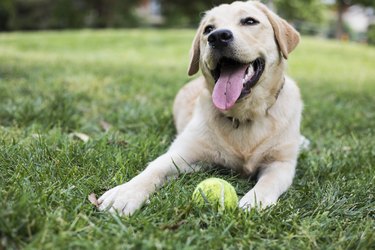
With spring just around the corner for most and already-warm climates for the rest, an unwelcome reality of increased temperatures remains the same year after year: bugs. More specifically, flies. If you or your dog spend any amount of time outdoors, chances are you've had to swat away a fly or two. We know how to keep fleas and ticks off our canine companions, but what can be done about pesky flies?
Fortunately, there are low-cost, chemical-free solutions to all your pest problems.
Video of the Day
Video of the Day
Fly spray for dogs
To make a DIY fly repellent spray, you have a couple of different options available when deciding which ingredients to use in your mixture. The first recipe many people look to when seeking to keep flies off their dogs requires vinegar and water, according to PetMD. To make this fly repellant spray, simply add equal parts vinegar and water to a spray bottle and shake well before spraying an even coat all over your dog. To help get your spray to stick to your dog's fur even better, you can add a drop or two of dish soap to the mix.
Despite some claims that apple cider vinegar will work to repel flies, we recommend steering clear as flies are typically drawn to the sticky, sweet smell of this type of vinegar. If you're hoping to rid your home or a part of your yard of flies, a trap made from apple cider vinegar, water, and dish soap will work great, as the flies will become attracted to the smell and fall into the water. However, because this recipe is just a spray that rests on your dog's fur and won't allow for enough liquid to trap them in the fly repellant, dogs may end up bothered by more flies, so it's recommended that you stick to regular white vinegar. If you're unsure which vinegar will work best for your dog, you can also try mixing lemon juice and water to repel flies.
Essential oils
The other method you can use to create an effective fly spray for dogs is to utilize the bug-repelling benefits of essential oils. To create an essential oil mixture, you'll need a large spray bottle of water and the essential oil of your choosing. According to the American College of Healthcare Sciences, some of the best essential oils for repelling bugs like flies include basil, eucalyptus, and bergamot.
Essential oil of thyme can also make for a great DIY fly spray ingredient, and also works to help repel mosquitoes naturally. Once you have your oil, add just a couple of drops to a full container of water to properly dilute the oil, as essential oils should never be applied directly to your pet's skin, even if it is listed as safe or non-toxic.
Before you apply essential oils to your dog for any reason, it's important that you do your research and consult your veterinarian. Why? Because many essential oils are toxic to dogs, cats, and other animals when ingested, and because the fly repellant spray is applied topically, the chance that your dog may lick some off is too high to risk. VCA Hospitals lists cinnamon, citrus, peppermint, and tea tree oil, among others, as essential oils poisonous to dogs, and ingesting even a small amount of any can result in symptoms such as difficulty breathing, drooling, and vomiting.
Fly collar for dogs
If you're going to be out and about for a while, or if your fly problem seems to affect your dog's neck, head, and ears more than any other part of his body, you can also make an easy fly collar for dogs. To do so, start by creating either of the above mixtures, then soak a bandana or cloth in the solution until it is soaked through. Next, ring out any excess moisture and tie the homemade collar around your dog's neck. If your dog is especially prone to bites around the ears, or currently has bites that are attracting more flies, you can cover them in petroleum jelly, which will prevent flies from biting the affected area.